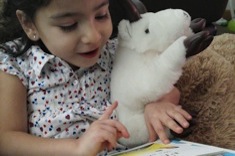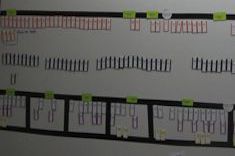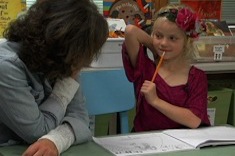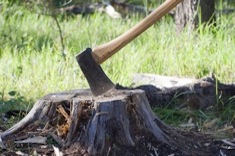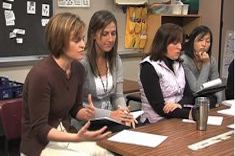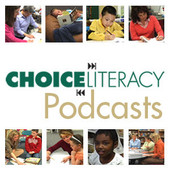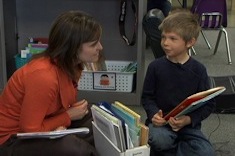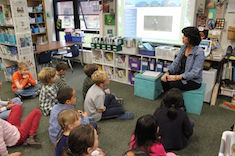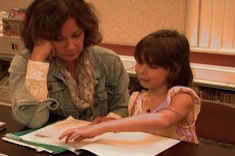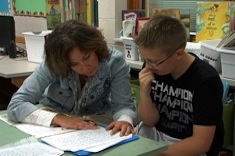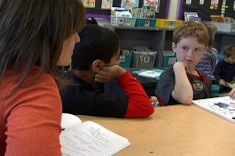1st
Latest Content
Animal Backpacks and Literacy Joy
Kelly Petrin finds animal backpacks are a wonderful tool for building literacy skills in young learners, as well as the home/school connection.
A Booklist for Memorial Day
Sarah Klim’s latest booklist includes titles for honoring those who serve on Memorial Day.
The Data Wall Debacle
Shari Frost has a suggestion for what shouldn’t be on classroom walls: student assessment scores. She explains why this practice can be harmful to students.
Understanding the Summer Slide: Sharing Data with Parents and Students
Clare Landrigan and Tammy Mulligan explain why it is important to share data with parents while school is still in session in order to avoid the summer slide. This is another installment in their summer reading series.
Supporting Struggling Readers: David’s Story
Katie DiCesare has wise advice for helping readers who are falling behind their peers but don't qualify for additional services.
Getting Ready for Summer Reading: A Lesson Cycle
Franki Sibberson designs a lesson cycle to prepare students for summer reading.
Reading Through Spring
Gigi McAllister has many suggestions for a strong reading finish to the school year.
Connecting Nonfiction Reading and Writing: Conferring with Hermione
Stella Villalba confers with Hermione, a first grader who is also an English language learner. Hermione is combining research and writing as she writes a nonfiction report.
Character Study Share Session in First Grade
First graders in Katie DiCesare’s class discuss character traits in books from independent reading during a whole-class share session.
Celebrating Screen-Free Week (BOOKLIST)
Screen-Free Week is scheduled for May 5-11 this year. Here are some book suggestions to help you explore the issue with students.
A Booklist for Earth Day
Earth Day is celebrated on April 22. Sarah Klim presents some favorite titles to share with students and build awareness in this booklist.
Visiting the Doctor: Conferring with Alexis
Ruth Ayres confers with first grader Alexis about her visit to the doctor for a shot. The conference focuses on illustrations and labeling.
Brave Noah
Ruth Ayres tells the story of Noah, a brave first grader with a hard home life who has few happily ever afters as a writer.
Word Observations
Max Brand describes how word observations can work as powerful minilessons in elementary classrooms.
Simplifying Word Study
Max Brand has suggestions for simplifying word study.
Katie DiCesare on Word Learning (PODCAST)
Katie DiCesare chats with Franki Sibberson about word learning in Katie’s first-grade classroom.
Sentence Combining in Workshops
Heather Rader has strategies for using sentence combining in literacy workshops.
Children’s Literature for the Olympics
The Olympics are just around the corner, and Sarah Klim has suggestions for read alouds in a new booklist.
Conferring with Sebastian
Katie DiCesare chats with first grader Sebastian in this one-minute conference, then shares her reflections on where Sebastian might go next in his reading.
Jennifer Serravallo on Formative Assessment (PODCAST)
Franki Sibberson chats with Jennifer Serravallo about formative assessment in this podcast. Jennifer is the author of The Literacy Teacher’s Playbook, Grades 3-6: Four Steps for Turning Assessment Data into Goal-Directed Instruction.
Formative Spelling Assessment
Max Brand has developed templates for grades K-2 and 3-5 to use for formative spelling assessments.
Keep Going
Ruth Ayres has advice for moving forward, staying positive, and focusing on what’s important.
Rereading for Writing: Conferring with Jack
Katie DiCesare confers with first grader Jack, using rereading to help him rethink the title of his story and possibilities for revision.
A Closer Look at Engagement
Are the terms stamina and engagement synonymous? Cathy Mere defines the terms by observing her first graders.
Inside and Outside Views: Conferring with Rebecca
Ruth Ayres confers with first grader Rebecca about perspective and illustrations in her writing.
Spelling Cycles: An Alternative to Weekly Spelling Lists
Max Brand developed Spelling Cycles as an alternative to weekly spelling tests. He explains how they work with an example from a third-grade class.
Powerful Conferences
Ruth Ayres explains how deciding the purpose of conferring in advance can lead to more powerful conferences.
Shared Blogging in the Primary Classroom
Shared reading and shared writing are essential instructional techniques in the primary grades. How about shared blogging for teaching children basic blogging skills? Cathy Mere describes how it works.
Partner Reading Conference in First Grade
Katie DiCesare confers with Jack and Praneel about their partner reading.
Group Conference in First Grade
Katie DiCesare meets with first graders Anna and Brendan to help them learn from each other and prepare to share their rereading strategies with the whole class.
Browse Content By
Type
Category
- Assessment Tools
- Big Fresh Archives
- Booklists
- Choice Numeracy
- Classroom Design
- Common Core
- Community Building
- Conferring
- Content Literacy
- Digital Literacy
- English Language Learners
- Equity
- Family Relations
- Free Samples
- Guiding Groups
- Leadership
- Literacy Coaches
- Mentor Texts
- Minilessons
- New Teacher Mentors
- Podcasts
- Poetry
- Quote Collections
- Reading Strategies
- Self Care
- Struggling and Striving Learners
- Talking and Listening
- Teacher Study Groups
- Teaching Reading
- Teaching Writing
- Word Study and Vocabulary
Author
- Melissa Quimby
- Nawal Qarooni
- Gwen Blumberg
- Julie Cox
- The Lead Learners
- Hannah Tills
- Josie Stewart
- Ruth Metcalfe
- Mallory Messenger
- Becca Burk
- Jodie Bailey
- Vivian Chen
- Mary Brower
- Tiffany Abbott Fuller
- Stephanie Affinito
- Ruth Ayres
- Leigh Anne Eck
- Heather Fisher
- Shari Frost
- Julie Johnson
- Suzy Kaback
- Gigi McAllister
- Shirl McPhillips
- Melanie Meehan
- Cathy Mere
- Debbie Miller
- Tara Barnett and Kate Mills
- Tammy Mulligan
- Dana Murphy
- Bitsy Parks
- David Pittman
- Brenda Power
- Heather Rader
- Matt Renwick
- Mandy Robek
- Christy Rush-Levine
- Gretchen Schroeder
- Jen Schwanke
- Brian Sepe
- Katherine Sokolowski
- Stella Villalba
- Jennifer Vincent
Grade Level
Choice Literacy Membership
Articles
Get full access to all Choice Literacy article content
Videos
Get full access to all Choice Literacy video content
Courses
Access Choice Literacy course curriculum and training

